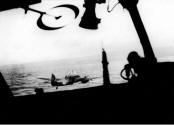|
||||
 |
||||
|
||||
|
History of Turnberry Aerodrome: (The following article first appeared in the Airfield Review Dec 1991 and is used by permission of the author Mr. Steve Winfield and the Airfield Research Group) Turnberry Airfield originally opened in 1917. During its short career it housed several units dedicated to teaching the art of aerial gunnery and fighting. Soon after it closed, though, the large field made it a logical choice for an A.A Landing ground during the 1930s. With the coming of World War 2 the Air Ministry’s eyes once again fell on Turnberry, and reconstruction began in 1941 by Wimpey who built a full WW2 aerodrome designed from the onset for training. In February 1942 No 5 OUT ( coastal ) arrived with Beauforts for training, moving out in December to make way for No 1 Torpedo training unit and their mixture of Beauforts and Hampdens in January 1943. September 1943 saw the arrival of No2 TTU only to be absorbed into No 1 TTU with the intention of concentrating all the various types of training and aircraft into one unit. Finally absorbing the air sea rescue training unit, a mixed fleet Ventures, Beaufighters and Hudsons saw No 5 OUT see out the war. 1945 saw the moving in of the Coastal Command Flying Instructors School. No 5 OUT now disbanded to be promptly replaced by No1 TTU making a reappearance. Both units left in November 1945 and so the airfield closed. The living sites were used to house the P.O.W`s in 1945 /46. Beginning in the early 1950s the aerodrome and its sites were returned to the public and the living sites were largely cleared in the 1950s. Turnberry was constructed right on the coast almost on a headland, the site being overlooked by hills to the east. Three runways were laid the main one being parallel to the hills. Lack of space meant the other two were relatively short, their approaches being either over the sea or down low over the hills. The main runway (North/East to South/West) was 04/22 of 6,250 feet behind which the tech site nestled against the hills. The two subsidiaries were 00/18 North to South) of 4,500 feet and 09/27 (East to West) of 3,900 feet the layout of the limited the number of hard standings. The bomb dump was sited on the hills overlooking the airfield and the living sites around the village of Maidens to the North/East, a number of local properties were also requisitioned. All that remains of a once proud and operation wartime training airfield is a few buildings and one of the three runways, as a sad reminder of the many young men and women who gave their lives for freedom. |
||||
|
||||
|
Turnberry Airfield Image 1 1024 |
Turnberry Airfield Image 2 1024 | Turnberry Airfield Image 3 1024 | ||
| Turnberry Airfield Image 4 1024 | Turnberry Airfield Image 5 1024 | Turnberry Airfield Image 6 1024 | ||
|
||||

























